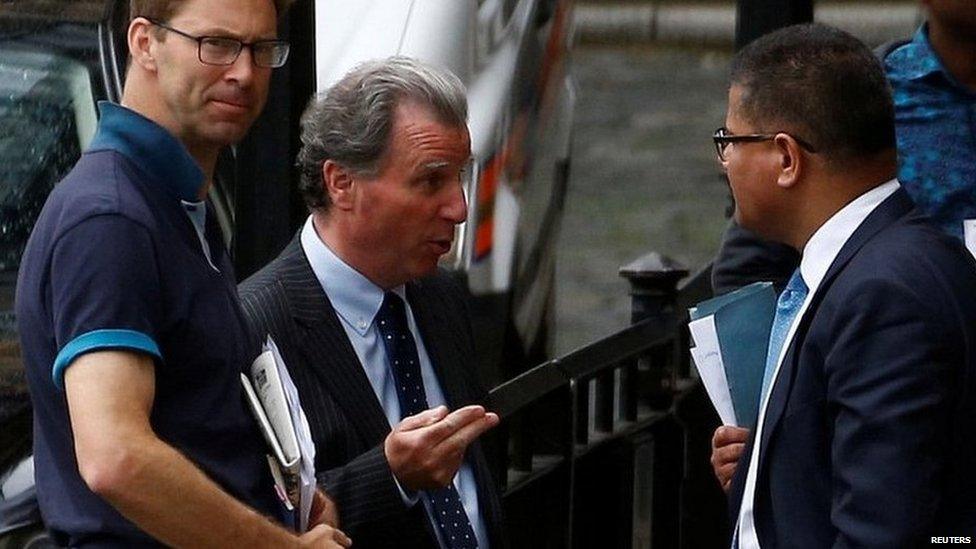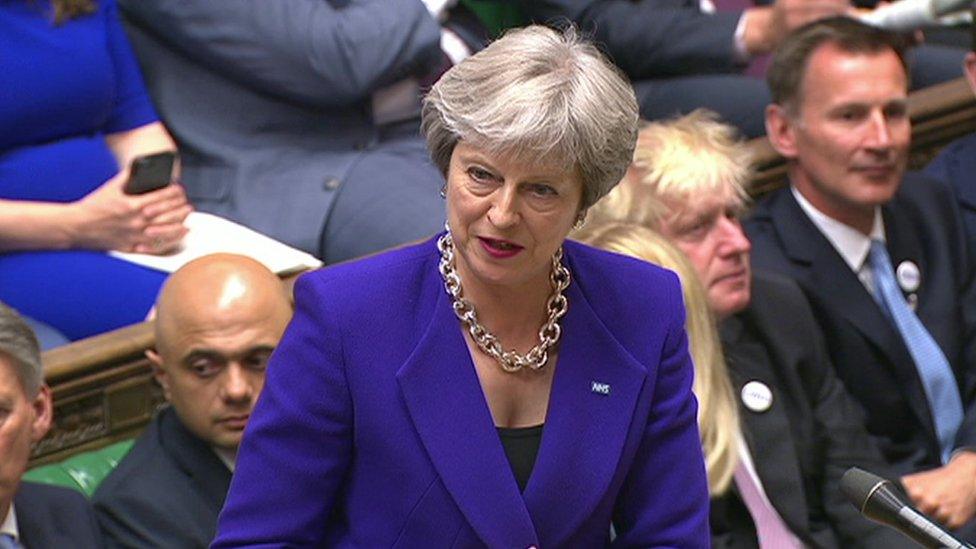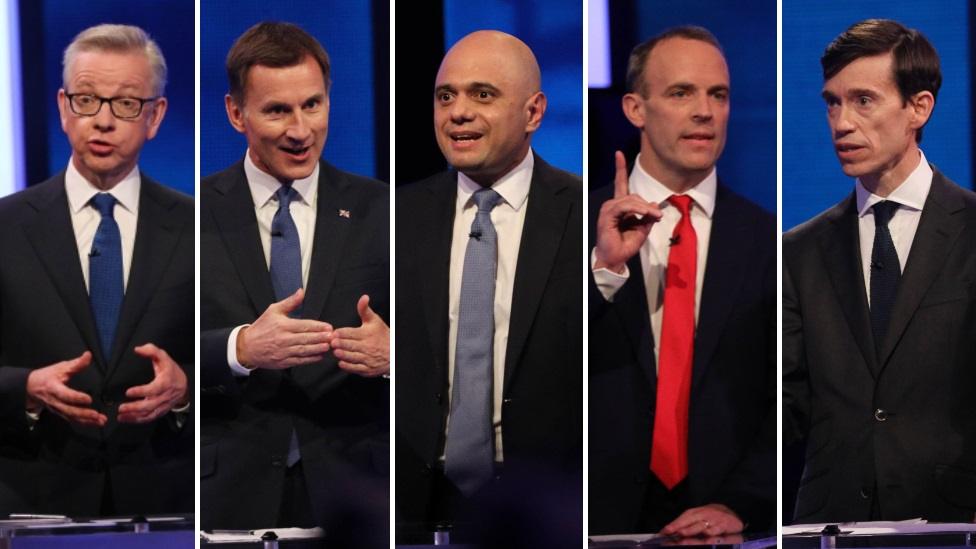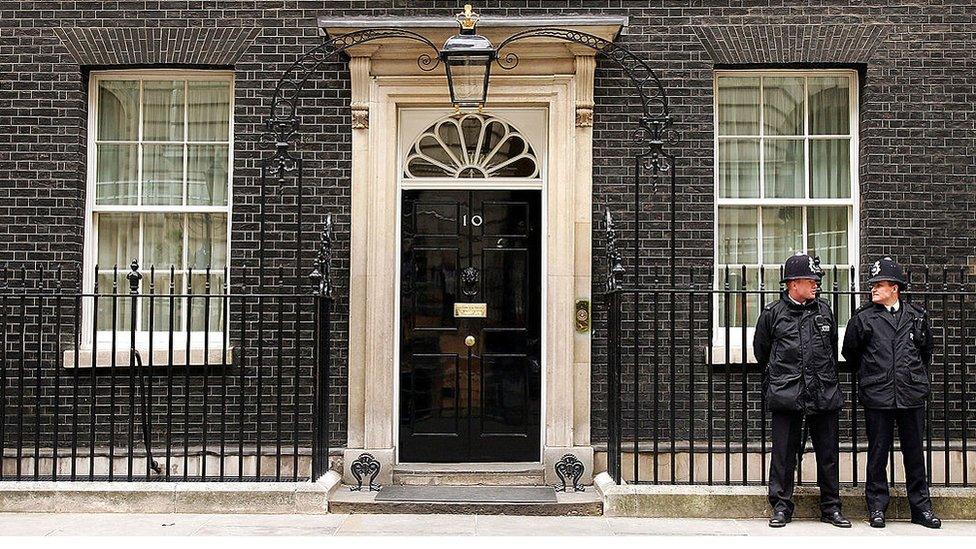Tory leadership race: How winner could change the atmosphere
- Published

As the second ballot approaches, there has been talk of deals and counter-deals among MPs
Until 18.00 BST, much of Westminster will be preoccupied with counting the number of hypothetical votes that are going to each one of the aspiring prime ministers.
Scurrilous whispers are whizzing round about deals and counter deals.
There are suggestions that some of Michael Gove and Boris Johnson's declared backers are secretly reaching out to Rory Stewart and gently wondering about potential jobs.
Conspiracists suggest that Boris Johnson's team are ordering some of their supporters to vote today for Jeremy Hunt to ensure he faces what they see as a vanilla politician in the final two.
Lots of politicians love nothing more than campaigning and hustling for votes, and what could be more fun for them when they don't even have to bang on doors in the rain to do so, but can plot happily in the tea rooms of Westminster?
Whoever ultimately wins through, however, will soon have to count a different set of numbers - those in Parliament.
They would inherit a government with no majority, and the same contradictions and conundrums of Brexit.
The common cry is therefore, unsurprisingly, the numbers won't change. The next sensible assertion follows - it's impossible therefore to see how anything like Theresa May's deal gets through Parliament.
And impossible, therefore, to see how any of the contenders could keep their promise to take us out of the EU without a cataclysmic event - leaving without a deal, calling an election, or embarking on another referendum.
In the BBC debate later, and over the next few weeks, we will ask and ask the candidates again if they refuse to answer, how they plan to stick to their promises to take us out of the EU, and what they would do instead if their plan backfires.
But although the first rule in politics is learn to count, there is a second adage that applies too - politics is meant to be the art of the possible.
In other words, if they possess real skills and talents, what can they actually get done?
Sure, the numbers won't change but a lot will with a new prime minister, even if not for very long. And in times when what seemed sensible assertions have been proven wrong so many times, it would be foolish to underestimate how different the atmosphere might be.
First off, if Boris Johnson wins, a Brexiteer will be in charge for the first time - whether you think that's to own the mess, or push for the ultimate win.
That will matter to Tory MPs who always suspected that Theresa May, hiding behind her red lines, always saw Brexit as a damage limitation exercise. Their hackles were up from the start. They are likely to respond differently to one of their own in charge.
Different MPs will also be part of the government too. Many of the collection of grey suits currently in the administration will take their seats up on the back of the green benches - swapping places, it's likely, with more of the Eurosceptics, who will move to the front.
There is less incentive for Brexiteers to kill a Brexiteers' deal.

Theresa May was not a regular in Westminster's tearooms
In a rebellious Parliament, under new leadership, the goodies become the baddies, and the baddies become the goodies.
Remainer ministers talk now of swathes of Tories who'd rebel to prevent no deal. But would they really behave as aggressively as the inner core of Brexiteers have done in the last few years? The numbers don't technically change, but different groups become the disgruntled and that will matter, probably a lot.
And there is still, just about it seems, a majority in Parliament for leaving the EU, but with a deal. To Downing Street's intense frustration, they always believed that was the case, but couldn't translate that into a win. That was, in part, down to the problem with the policy, and the long-running divisions inside the Tory party.
But it was also because Theresa May was just not able to win her colleagues round. She used to boast that she was not a creature of Westminster's bars and tearooms, not someone who enjoyed the political game.
But in this crazy village, that's how arguments are won. Some of her colleagues who did get brief facetime with her even said they left the room feeling less likely to support her. It may not be fair, but persuasion is a real power, and Theresa May didn't have much of it.
Diligence is not a substitute for being able to talk someone round.
A new leader might, I stress, be well able to do that. Not just with MPs in Westminster, but also maybe with the EU.
Politics is about numbers - yes, but it's about persuasion, alchemy and force of personality. To simply say the numbers won't change excludes the - as yet - unknown power of leadership.
It is perfectly possible, of course, that the new leader will implode, or within months be overwhelmed by the same obstacles that broke Theresa May.
But maybe, just maybe not. Has it really been so long since we've had truly convincing politicians that we have forgotten what they can really do?
- Published17 June 2019

- Published13 June 2019

- Published10 July 2024

